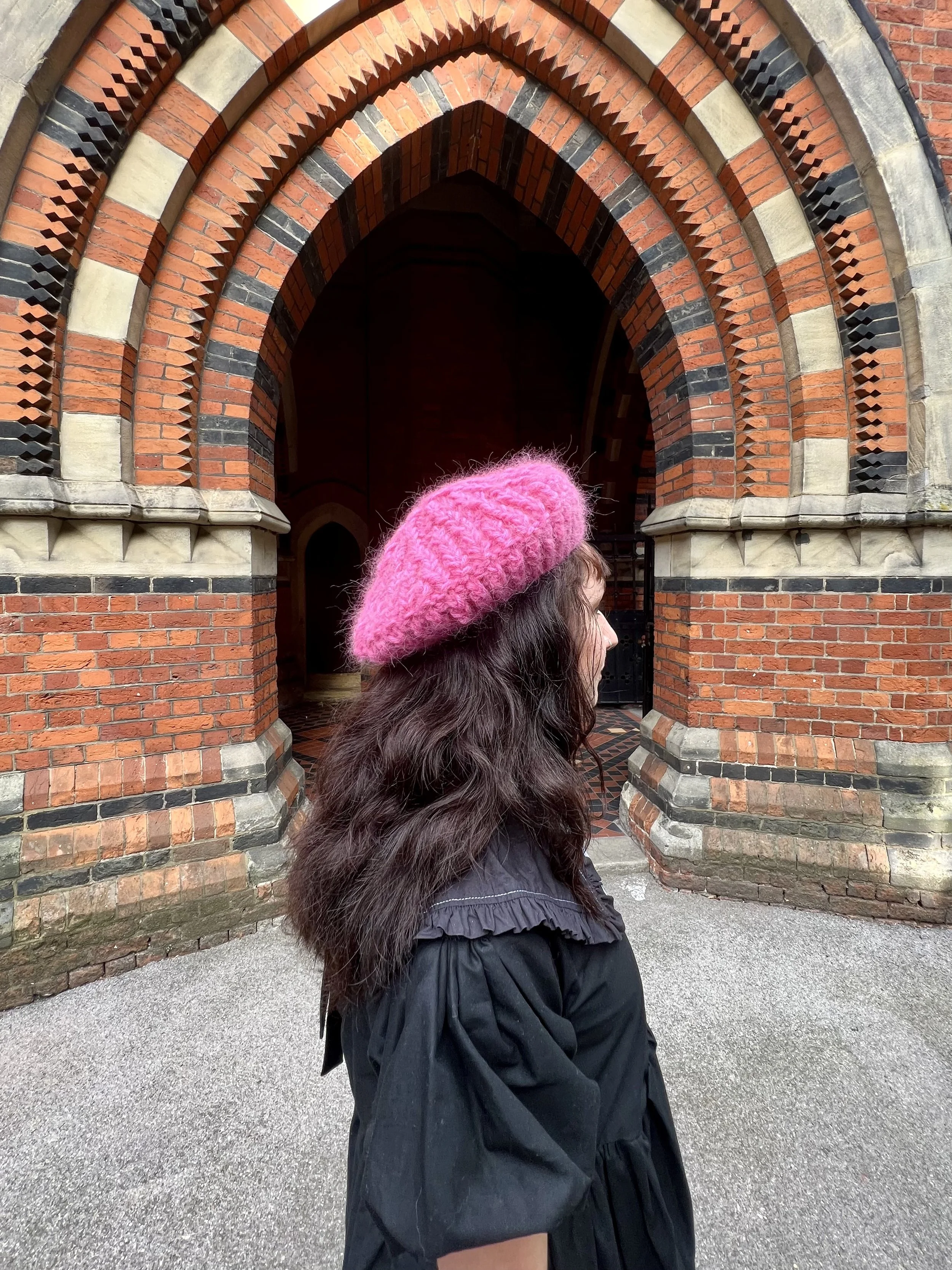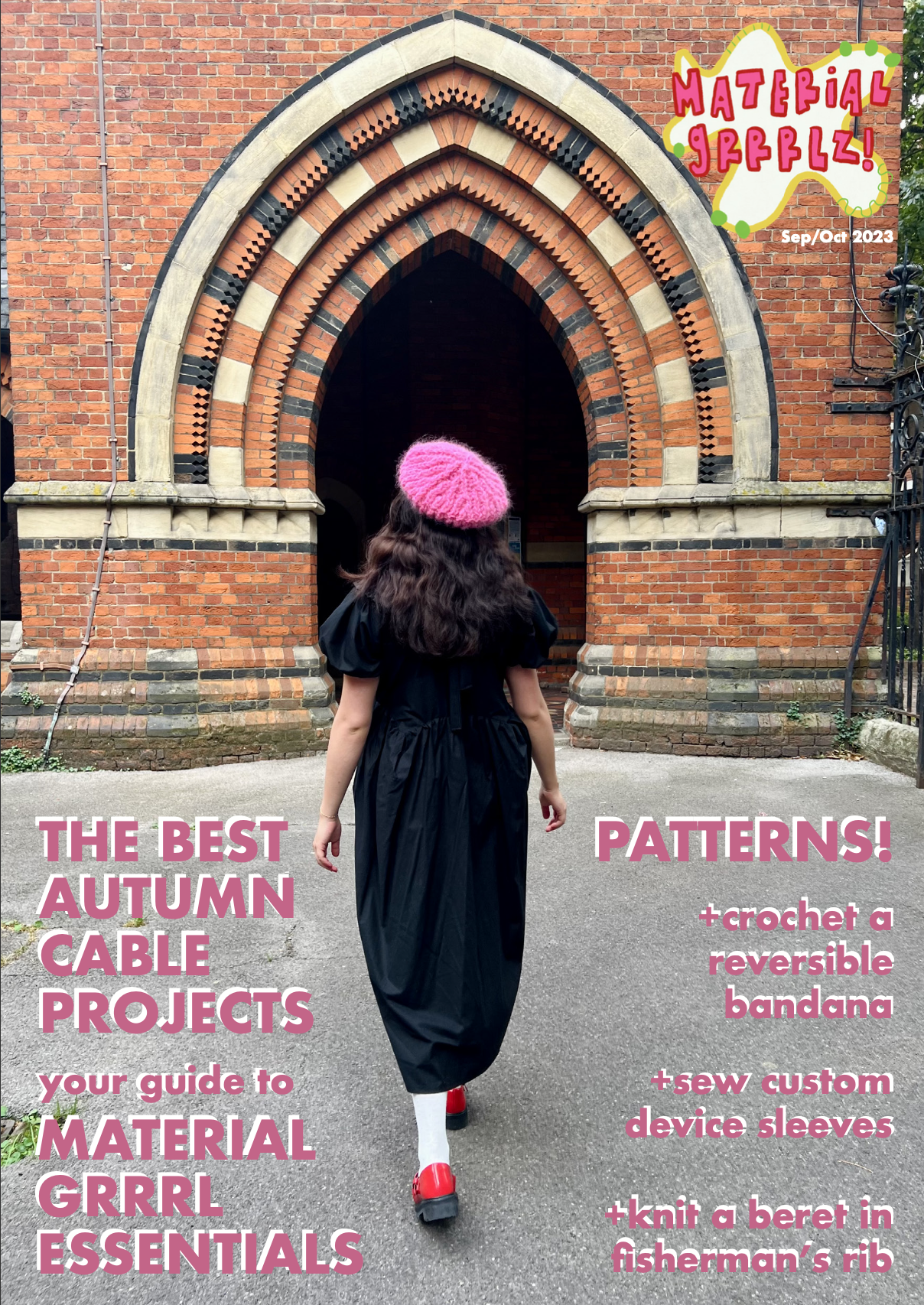fisherman’s rib beret
about
Fluffy berets are all over the runway and now you can add your own to your closet! Made in fisherman’s rib stitch, this beret is uber-squishy and includes a fun decrease design across the top. Holding yarns together makes this piece super chunky and a very quick knit - might as well pump one out in every color to keep on rotation all season;)
materials
+ 6.5mm circular needles
+ 8mm circular needles
Optional: 8mm double pointed needles may be used as you decrease stitches on the top. If you use circular needles, you can use the magic loop method as you decrease.
+ 1 skein 50g/100m yarn
+ 1 skein 50g/140m yarn
Throughout the pattern, hold these two yarns together. Originally created with one wool and one mohair strand to create a fuzzy look.
gauge
+ 16 sts by 18 rows = 4x4 inches/10x10 cm Using 6.5mm needles in 1x1 rib stitch
+ 15 sts by 25 rows = 4x4 inches/10x10 cm Using 8mm needles in fisherman’s rib stitch
abbreviations
St(s) - stitch(es)
Rep - repeat
PM - place marker
SM - slip marker
K - knit
P - purl
K1b - knit 1 below
P1b - purl 1 below
LLDD - left leaning double decrease
*...* - repeat instructions between the asterisks across the row
construction
This beret is knit bottom to top, beginning with ribbing that rests on the head. You will then switch to fisherman’s rib stitch to create the body of the beret, gradually decreasing as you reach the middle.
techniques
Fisherman’s rib stitch is created by knitting 1x1 rib for one “set-up row,” then alternating between rows repeating (knit 1 below, purl 1) and (knit 1, purl 1 below).
+ Knit 1 below (K1B): make a knit stitch through the stitch below the one on your needle
+ Purl 1 below (P1B): make a purl stitch through the space below the stitch on your needle
Decreasing in fisherman’s rib stitch involves combining three stitches into one stitch (this ensures that the ribbing pattern continues correctly).
+ Left leaning double decrease (LLDD): Slip 1 below knitwise, knit 2 together, pass slipped stitch over the second stitch as if casting off.
Video tutorials for each technique are available on YouTube.
FINE PRINT: COPYRIGHT © 2023 ALEXA KARI DESIGNS. FOR PERSONAL USE ONLY. READER/ PURCHASER MAY NOT COPY, RESELL, OR REDISTRIBUTE ANY PART OF THE PATTERN WITHOUT PERMISSION. READER/PURCHASER MAY NOT SELL ANY GARMENTS CREATED FOLLOWING THE PATTERN. Subscribe to get free patterns straight to your inbox:)
fisherman’s rib beret pattern
headband
Using 6.5mm needles, cast on 78 stitches with a stretchy cast on and close the round.
1x1 rib for 3 rows (rep k, p)
body
Switch to 8mm needle
Set up row - rep (k, p)
Row 1 - rep (k1b, p)
Row 2 - rep (k, p1b)
Alternate between rows 1 & 2 two more times (6 rows total)
Using 6.5mm needles, purl one round
top
Switch back to 8mm needles
Row 1 - rep (k,p)
Row 2 - rep (k1b, p)
Row 3 - rep (k, p1b)
Row 4 - rep (k1b, p)
Row 5 - rep (k, p1b)
As you knit this round, place 6 markers throughout the row - 14 sts, pm, 12 sts, pm, 14 sts, pm, 12 sts, pm, 14 sts, pm, 12 sts, (original marker - make sure it’s differentiated from others)
Row 6 - *LLDD, rep (p, k1b) to next marker, sm*
Row 7 - rep (k, p1b), sm as you reach each
Row 8 - rep (k1b, p), sm as you reach each
Row 9 - rep (k, p1b), sm as you reach each
Row 10 - *k1b, p, k1b, p, LLDD, rep (p, k1b) to next marker, sm*
Row 11 - rep (k, p1b), sm as you reach each
Row 12 - rep (k1b, p), sm as you reach each
Row 13 - rep (k, p1b), sm as you reach each
Row 14 - *LLDD, rep (p, k1b) to next marker, sm*
Row 15 - rep (k, p1b), sm as you reach each
Row 16 - rep (k1b, p), sm as you reach each
Row 17 - rep (k, p1b), sm as you reach each
Row 18 - *k1b, p, k1b, p, LLDD, p, sm, k1b, p, LLDD, p, sm*
Row 19 - rep (k, p1b), sm as you reach each
Row 20 - rep (k1b, p), sm as you reach each
Row 21 - rep (k, p1b), sm as you reach each
Row 22 - *LLDD, rep (p, k1b) to next marker, sm*
Row 23 - rep (k, p1b)
As you knit this round, remove all markers (except the one at the beginning of the round)
Row 24 - rep (k1b, p)
Row 25 - rep (k, p1b)
Row 26 - rep (LLDD, p) to last 2 sts, k1b, p
Row 27 - rep (k, p1b)
Cut string and weave it through the remaining 10 stitches. Pull to close the hole, then weave in the end.
This pattern was originally published in the Sep/Oct 2023 issue of Material Grrrlz
Download the whole issue for free here!
(featuring even more free patterns and girlie fiber art activities…)



